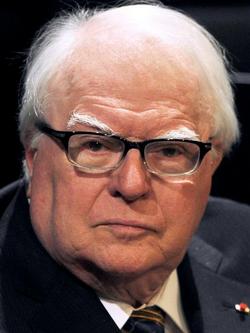
Pierre Mauroy (French: [pjɛʁ moʁwa]; 5 July 1928 – 7 June 2013) was a French Socialist politician who was Prime Minister of France from 1981 to 1984 under President François Mitterrand. Mauroy also served as Mayor of Lille from 1973 to 2001. At the time of his death Mauroy was the emeritus mayor of the city of Lille. He died from complications of lung cancer on 7 June 2013 at the age of 84.
As prime minister, Mauroy's government implemented a range of social reforms during its term. These included reducing the legal workweek, lowering the retirement age, increasing social welfare benefits, and extending entitlement to paid holidays. The government increased state industrial investment, provided credit to private industry, created new civil service jobs, and launched a housebuilding drive. It also reduced the burden of direct taxes on lower-income groups, increased the minimum wage and unemployment benefits, and extended health care coverage. The Mauroy government also introduced measures to promote voluntary retirement, early retirement, and improve socio-economic conditions in low-income neighborhoods. Harsh immigration statutes were reversed, new rights were introduced for helper spouses, and an anti-discriminatory Professional Equality Law was enacted. The government also passed decentralizing laws that transferred responsibilities for urban and economic planning to municipalities and regions. These policies significantly improved the living standards of the less well-off in French society, reducing poverty during Mauroy's term in office
In the early 1980s, the Mauroy government introduced several ordinances and laws aimed at promoting gender equality, improving working conditions, and increasing access to education. These included limiting the duration of fixed-term contracts and assignments, opening up civil service jobs to women, abolishing tax laws that favored the head of the household, and providing special aid to farmers. The government also increased funding for education and created new teaching positions, particularly in technical education, and established Educational Priority Zones to address academic failure in depressed areas. Reforms were also introduced to make entry to the National School of Administration more accessible to a wider range of French society, including raising the age limit and reducing the advantage of upper-class applicants.
The Auroux Laws of 1982 improved the rights of trade unions and employees in France, including collective bargaining, representation, information, health and safety, and protection against unfair dismissal. The laws required compensation for overtime and increased paid time off for union activities. They also established mandatory collective bargaining and strengthened rules on health and safety. However, the comite d'entreprise remained a consultative body with limited influence on economic policy, and smaller firms were not required to provide economic information to their comite. The government also introduced measures to provide greater employment security for part-time and fixed-term workers, ensure equal benefits for women in civil service, and encourage the formation of immigrant associations. New policies removed language requirements for immigrants in employee institutions and allowed foreign workers to sit on industrial relations councils. A program to assist the repatriation of Algerian nationals was also replaced with a choice between vocational training, business assistance, and a repatriation grant.
The Mauroy Government in France passed several laws that reduced the powers of the prefect, increased the powers of local government and set up elected regional councils. They also abolished the security court and introduced measures to control police harassment. The government extended legal aid and passed legislation that combated discrimination against homosexuals. They reformed higher education, made the ENA more accessible and implemented a new healthcare policy that abolished private beds in hospitals. Additionally, the Mauroy Government promoted arts, culture and education by tripling state aid to the arts, quadrupling spending on public libraries and providing aid to provincial art museums and local archives. They also increased funding to provincial libraries, which resulted in more people obtaining access to major lending library resources. The provinces acquired new theatres, artistic centres, music halls, ballet companies, and popular culture facilities. Overall, the government significantly increased spending on culture from 0.45% of the national budget to 0.84% in 1984.
The social security reforms in France during the 1980s led to increased incomes for the poor, with a 25% increase in the minimum wage and improved allowances for the handicapped and child care. The right to claim sickness insurance was given back to unemployed workers and the costs of dental fees, hearing aids, and glasses were reimbursed. The minimum pension benefit for the elderly poor was raised by 62%. The SAFER was extended to assist young farmers, and various measures were introduced to boost farmers' incomes. Self-employed women were provided with a lump-sum maternity grant, and unemployment compensation was expanded to include workers who had resigned from their jobs. However, the reflationary economic strategy failed to improve the French economy in the long term, with increases in the level of inflation and trade and budget deficits. The number of people out of work topped 2 million, and austerity measures were carried out, including reducing unemployment benefits' duration and tightening eligibility, reducing guarantees to full pensions for early retirees, introducing hospital charges, and reducing medical reimbursements. The aim of the Socialists during the austerity period was to safeguard the position of beneficiaries and give special consideration to the poorest among them. While extra costs were imposed, efforts were made to restrain family costs while safeguarding priority groups. Failing to restrict the financing of private schools via the Savary Law, he resigned in 1984.
Source : Wikipedia